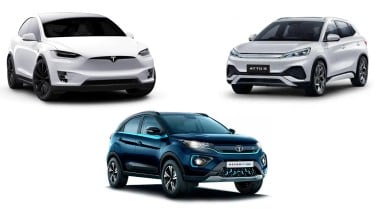Tesla and BYD are probably the first 2 names that come to anyone’s mind globally when one thinks about the technological prowess in the electric vehicle space. And it comes as no surprise, that the Chinese and American car brands have topped the International Council on Clean Transportation’s (ICCT) Global Automakers Rating 2022. Interestingly, of the 20 global automakers present in the list, at #18 Tata Motors was the only Indian automaker to make it to the list.
ICCT has rated the world’s largest auto manufacturers in their transition towards electric vehicles on three key parameters – Market Dominance; Technology Performance and Strategic Vision. It has evaluated the work of manufacturers toward the goal of climate change and rated them on 10 custom-built metrics that reflect both what they are doing now and what they say they will do in the near future. The OEMs have been evaluated by their current fleets, and production processes and assessed on their stated future plans, policies, and priorities.
The automakers have been scored on a scale of zero to 100. Tesla and BYD topped the overall charts and were considered leaders with a score of 83 and of 73 respectively.
European OEMs BMW, and Volkswagen Group, followed by Stellantis got a score of 56, 53, and 50 respectively grabbing their spot in the top 5 automakers globally.
Despite the Indian passenger vehicle industry still lagging behind its global counterparts when it came to electric vehicle adoption, Tata Motors’ aggressive focus on investment in technology and product development helped it score above leading Japanese, Chinese, and European brands in the Technology Performance charts.
Amit Bhatt, India MD, ICCT said, “The fact that the only Indian automaker in the rating ranks near the bottom shows that the Indian market is trailing on the EV transition compared to other major markets. However, recent announcements by OEMs that they are committed to net zero emissions and a simultaneous increase in EV sales indicates that the situation may improve in the future.”
The report found three key takeaways from the results, firstly, most automakers score well on at least one metric. This is due to the complexity and breadth of the transition towards zero-emission vehicles, as well as differing approaches from automakers.
Secondly, every automaker has work to do. Even Tesla’s and BYD’s ratings were weak on some metrics. For example, the rating shows that Tesla needs to offer more models across the size spectrum. In 2022, Tesla offered models in only three out of eight vehicle classes identified by ICCT. Similarly, BYD has work to do to improve the technological attributes important to consumers.
Lastly, manufacturers headquartered in Japan and India must work to catch up to competitors in the transition. ‘All five manufacturers headquartered in Japan and Tata Motors, headquartered in India, are at the bottom of our rating,’ stated the report.
The report stated that to improve, they need to increase their EV sales, set public zero-emission vehicle targets, and invest significantly. It is the case, though, that in the absence of effective government policies, the domestic markets for EVs in Japan and India are anemic at present. However, these companies would have rated higher if they had announced stronger targets and investment plans for the zero-emission vehicle transition.
“Considering the Dieselgate scandal was only 7 years ago, it is remarkable to see Volkswagen emerge as a serious leader in the transition to 100% zero-emissions vehicles,” said Rachel Muncrief, Acting Executive Director of ICCT. In 2015, research from the ICCT broke the Dieselgate scandal.
Zifei Yang, the project manager and ICCT’s passenger vehicle program lead said, “Our goal with this report was to provide a data-driven, transparent analysis of automakers’ progress toward decarbonisation, in their plans and actions.”
